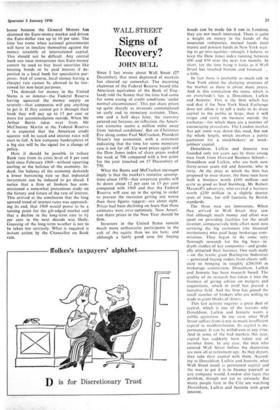WALL STREET
Signs of Recovery?
JOHN BULL
Since I last wrote about Wall Street (27 December), that most depressed of markets has cheered up somewhat. The incoming chairman of the Federal Reserve board (the American equivalent of the Bank of Eng- land) told the Senate that the time had come for some easing of credit conditions 'under normal circumstances'. This put share prices up quite sharply as investors contemplated an early end to monetary restraint. Then, one and a half days later, the recovery petered out because, on reflection, the Ameri- can economy seems a million miles away from 'normal conditions'. But on Christmas Eve along comes Paul McCracken, President Nixon's top economist, with a statement indicating that the time for some monetary ease is not far off. Up went prices again and the Dow Jones index of share prices ended the week at 798 compared with a low point for the year (reached on 17 December) of 770.
What the Burns and McCracken messages imply is that the market's tentative assump- tions about 1970—that corporate profits will be down about 12 per cent to 15 per cent compared with 1969 and that the Federal Reserve will ease up in the spring in order to prevent the recession getting any worse than these figures suggest—are about right. Prices had been declining on fears that these estimates were over-optimistic. Now Ameri- can share prices in the New Year should be firm.
Investors in the United States remain much more enthusiastic participants in the cult of the equity than we are here; and although a fairly good case for buying bonds can be made (as it can in London), they are not much interested. There is quite a weight on money in the hands of the insurance companies, mutual funds (unit trusts) and pension funds in New York wait- ing to go into equities—enough, I believe, to keep the Dow Jones index running between 800 and 850 over the next few months. In short, for the time being it looks as if Wall Street has touched bottom and bounced . a little.
In fact there is probably as much talk in New York about the changing structure of the market as there is about share prices. And in this connection the name which is on everybody's lips is Donaldson, Lufkin and Jenrette. This is the firm which has said that if the New York Stock Exchange does not allow it to sell a stake in its share capital to the public at large, then it will resign and carry on business outside the exchange—for which there are a number of encouraging precedents. The London market has got some way down this road, but not the whole length, which involves a public quotation for a stockbrokers' or stock- jobbers' capital.
Donaldson, Lufkin and Jenrette was founded only ten years ago by three young men fresh from Harvard Business School— Donaldson and Lufkin, who are both now thirty-seven years old and Jenrette, who is forty. At the price at which the firm has proposed to issue shares, the three men have built a business worth £100 million—not quite as good as Saul Steinberg, Mr Robert Maxwell's adversary, who created a business worth £250 million in a slightly shorter span. of time, but still fantastic by British standards.
The three men are innovators. When they arrived in Wall Street they saw that although much money and effort was spent on providing facilities for the small investor, comparatively little effort went into servicing the big customers (the financial institutions) who paid large brokerage com- missions. They began to do some very thorough research for the big boys—in- depth studies of key companies—and gradu- ally attracted their business. One such study —on the textile giant Burlington Industries —generated buying orders from clients suffi- cient to bringing in roughly £200,000 in brokerage commission. Donaldson, Lufkin and Jenrette has been research based. The quality of its research has taken it into the business of giving advice on mergers and acquisitions, which in itself has proved a lucrative field. And the firm has joined the small number of brokers who are willing to trade in giant blocks of shares.
This last activity requires a great deal of capital, which is one of the reasons why Donaldson, Lufkin and Jenrette wants a public quotation. In my view what Wall Street suffers from is not so much insufficient capital as maldistribution. Its capital is im- permanent. It can be withdrawn at any 'me. And in some of the bad markets this year, capital has suddenly been taken out of member firms. In any case, the men who entered Wall Street before the depression are now all at retirement age. As they depart, they take their capital with them. Accord- ing to Donaldson, Lufkin and Jenrette, what Wall Street needs is permanent capital and the way to get it is to finance yourself as any company would. London also faces this problem, though not yet so seriously. But many people here in the City are watching Donaldson, Lufkin and Jenrette with great interest.














































 Previous page
Previous page